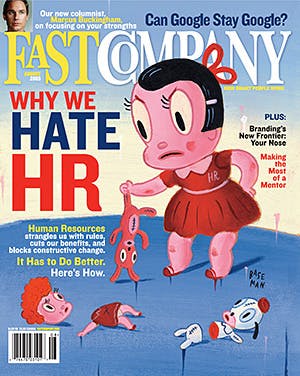Something snapped the other day when I read the TLNT post on HR’s “first official standard” on cost-per-hire – after two years of work by a 42-member committee. The article also mentioned another committee is working on a standard for drafting job descriptions.
I immediately thought of the cover story on Why We Hate HR in Fast Company magazine. Then I also realized I work in a field where, except for new technology, there has been little change in decades.
If it was up to me, job descriptions would be eliminated. If you ask someone what they do at a cocktail party, it takes them two or three minutes to tell you.
Years ago someone studied the time to draft a job description – that was when job analysts interviewed incumbents to start the process – and concluded it took 12 hours until the document was finally approved. Now we can buy them in bulk, of course. But regardless they still delimit what an employee can do.
Giving up on HR?
Yes, I know position descriptions (PDs) supposedly have multiple uses but they are often stored and not looked at again until someone claims the job is changed. Yes, managers and their reports need to agree on job duties, but they should be able to do that as necessary in brief conversations. However, this is not about job descriptions — although I contend the field does not need a standard for drafting them.
There have been periodic articles for at least 20 years on what HR needs to do to gain a seat at the executive table. The discussion of a cost-per-hire standard reminded me of a statement toward the end of that Why We Hate HR article: “The problem, if you’re an HR person, is this: The tasks companies are outsourcing — the administrivia — tend to be what you’re good at.” It should be obvious but the focus on outsourcing, self service, and automation — and standards focused on controlling the costs of HR — hardly demonstrates the value of HR.
Recently I wrote a post titled Here’s Why It’s Finally Time to Redefine the Role of HR. Before publication, I sent it to several people for comment. Ed Lawler sent me a note with a recent article of his in which he made essentially the same recommendation. A statement in his note is worth repeating: “I have given up on HR doing this type of thing. It has led to my view that a new staff group is needed (see attached article).” That statement from Ed continues to bother me.
One of the repeated themes in articles on gaining that “seat at the table” is the need to develop and demonstrate an understanding of the business. As a consultant, I certainly agree but I also know that a limited number of meetings with senior executives should suffice. That’s routine for experienced consultants. HR executives do not need the same understanding as the CEO. Presumably executives in marketing, law, engineering and other functions have to satisfy a similar requirement.
The value of HR – and the justification for high compensation packages – is that we understand the importance of people in realizing organizational success. We need to understand the business strategy and a basic understanding of other functions so we can work as partners with those executives and managers to help them get the best from their people.
Several years ago Dave Ulrich sent me a copy of his book, The HR Value Proposition (co-authored with Wayne Brockbank). It’s only recently that I came to truly appreciate his argument. He distinguishes between those HR practices that add value and, although he is too respectful to use the phrase, those that don’t. But in his own way he agrees with the thrust of the Fast Company article.
Wanted: a positive impact on results
The value of HR is not in how well or efficiently we administer HR programs. Of course cost management is important, but regardless of how well we do that, it does not warrant a seat at the table.
It’s also not in identifying and adopting best practices – unless those practices contribute to achieving organization success. Looking back, I’ve helped clients design and implement some of the best pay and performance systems – or so I thought – but it’s only recently that there has been any attempt to determine how new systems impact the organization.
Ulrich also makes the important point that “value is defined by the receiver, not the giver.” For HR to be invited to the table, we need to develop evidence confirming the function’s positive impact on results. He focuses on the “flow of people and performance” and on the “flow of information and work.” I would argue that the latter are typically not controlled by HR but otherwise his discussion outlines the strategy to gain that invitation.
At this stage, after years of expressing our interest in gaining that seat, this is a time for action, not more words. We need to assess the policies, practices and systems controlled by HR to create what Ulrich calls a “people and performance menu.”
I started with Ulrich’s book and identified 25 practices for that menu. A small group of HR specialists can complete this ‘audit’ in a week or two. Where that linkage is weak, we need to strengthen the practice.
That is likely to raise performance more than any actions by other functions. HR needs to confirm its value.
